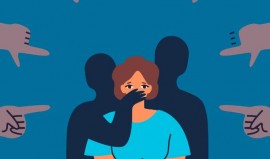"Domestic Violence and Economy "

Domestic violence, also known as intimate partner violence, is a serious and pervasive social problem that affects individuals, families, and communities around the world. Domestic violence is a pattern of behavior in which one person in a relationship uses physical, sexual, emotional, economic, or psychological abuse to control or dominate the other person. It can happen to people of all genders, sexual orientations, and ages, and it can have serious and long-lasting effects on the physical, mental, and emotional well-being of the victim.
Domestic violence is a common issue in South Asia and is often perpetrated against women and children. It can take many forms, including physical, sexual, and emotional abuse, and can have serious consequences for the victims, including physical injury, mental health problems, and even death. Domestic violence is often condoned by society and can be difficult for victims to escape due to a lack of resources and support. It is important for governments and communities in South Asia to take action to address domestic violence and provide support for victims. This can include providing access to emergency shelters, hotlines, and counseling services, as well as strengthening laws and increasing awareness about the issue.
The economic impact of domestic violence is horrific and devastating. It can result in lost productivity, increased healthcare costs, and damage to personal and public property. It can also lead to decreased earning potential and financial instability for survivors, who may have to miss work, relocate, or leave their jobs due to abuse. The costs of domestic violence extend beyond the immediate victims to society as a whole. Domestic violence can have negative impacts on children and families, leading to increased rates of absenteeism, poor academic performance, and mental health problems. It can also strain social services and law enforcement resources, as well as have negative impacts on the economy more broadly. Preventing and addressing domestic violence is essential for the well-being of individuals, families, and communities, as well as for the overall economic health of society. This requires a comprehensive approach so that there will be proper access to education, prevention, intervention, and support services for survivors. It also requires addressing the underlying social and economic factors that contribute to domestic violence, such as gender inequality and economic instability.
